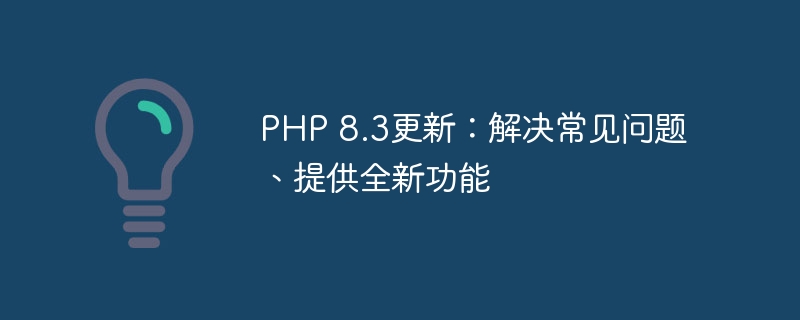

In the recently launched PHP 8.3 version, we have ushered in a series of updates and improvements. These updates not only resolve common issues, but also provide developers with brand new features. This article will give you a detailed introduction to some important changes in PHP 8.3.
First of all, PHP 8.3 solves some problems that existed in previous versions. One of them is the improvement of error handling mechanism. In previous versions, PHP would often terminate program execution when an error occurred. In PHP 8.3, a new error handler was introduced, allowing developers to have more control over how errors are handled. Developers can now choose how to handle errors, such as continuing execution, logging an error message, or performing some custom action.
In addition, PHP 8.3 also introduces better support for nullable types. In previous versions, errors were often caused when operating with null values. In PHP 8.3, by introducing the nullable type, developers can explicitly specify the value types that the variable can accept when declaring the variable, including null. In this way, potential errors can be discovered earlier when the code is running, thereby improving the robustness and maintainability of the code.
In addition to solving the above problems, PHP 8.3 also brings some new features to developers. One of the important features is the type declaration of properties. In previous versions, the type of properties was often ignored, leading to the introduction of many hidden dangers in the code. In PHP 8.3, developers can type declarations for properties, making the code clearer and more readable, and providing better code hints and type checking.
In addition, PHP 8.3 also introduces some improvements to anonymous classes and closure functions. Anonymous classes now support the use of properties and methods, making it easier for developers to encapsulate temporary logic. At the same time, the performance of closure functions has been improved, making it more efficient when using closure functions.
In terms of performance, PHP 8.3 has also been improved to a certain extent. By improving the underlying engine and optimizing some common operations, PHP 8.3 can execute code faster and reduce memory consumption. This means developers can run more code on the same hardware, improving application performance and responsiveness.
Finally, it is worth mentioning that PHP 8.3 has made some improvements to the database access API. The new API provides a more intuitive and consistent interface, making it easier for developers to perform database operations. In addition, the new API also adds support for more database engines, allowing developers to choose a database engine that better suits their needs.
In summary, the PHP 8.3 update solves a series of common problems and brings many new features. These improvements not only make the code more robust and maintainable, but also increase developer productivity. If you are a PHP developer, you may wish to try upgrading to the latest PHP 8.3 version to experience the benefits of these updates. Whether it's solving problems or delivering new features, PHP 8.3 provides better support for your development efforts.
The above is the detailed content of PHP 8.3 update: resolves common issues and provides new features. For more information, please follow other related articles on the PHP Chinese website!




